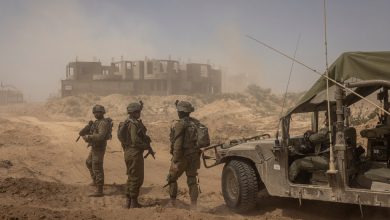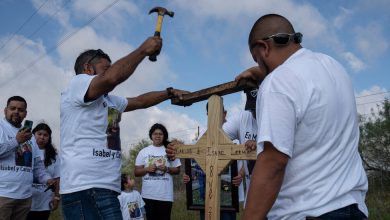Voting Is Over in Kenya’s Election. Now the Battle Continues.

NAIROBI, Kenya — A wave of relief tinged with jubilation washed across Kenya on Tuesday as its hotly contested presidential election passed largely peacefully after months of bitter jostling and mud slinging. Supporters feted one of the front-runners, Raila Odinga, at his Nairobi stronghold, while his rival, William Ruto, praised the majesty of democracy after casting his vote before dawn.
But as the voting ended, a new battle was likely beginning.
The close of polls saw Kenya’s election shift into a new and unpredictable phase that, if previous polls are a guide, could be rocky — a prolonged period of high political drama that in the past has involved accusations of vote-rigging, protracted courtroom wrangling, bouts of street violence and, in 2017, a shocking murder mystery.
It could take weeks, even months, before a new president is sworn in.
“People just don’t trust the system,” Charles Owuiti, a factory manager, said as he waited to cast his ballot in Nairobi, the line snaking through a crowded schoolyard.
Still, the corrosive ethnic politics that framed previous electoral contests have been dialed down. In the Rift Valley, the scene of prior electoral clashes, fewer people than in the previous years fled their homes fearing they might be attacked.
Instead, Kenyans streamed into polling stations across the country, some in the predawn darkness, to choose not just their president, but also parliamentarians and local leaders. Among the four candidates for president, the vast majority of voters opted for either Mr. Odinga, a 77-year-old opposition leader running for the fifth time, or Mr. Ruto, the outgoing vice president and self-declared champion of Kenya’s “hustler nation” — its frustrated youth.
“Baba! Baba!” yelled young men who crushed around Mr. Odinga’s vehicle in Kibera, on the outskirts of Nairobi and said to be Africa’s largest slum. They used his nickname, which means “father.” The septuagenarian leader struggled to keep his feet as he was swept into a polling station.
Mr. Ruto made a show of apparent humility while casting his vote. “Moments like this is when the mighty and the powerful come to the realization that the simple and ordinary eventually make the choice,” he told reporters.
But for many Kenyans, that wasn’t a choice worth making. The electoral commission estimated voter turnout at 60 percent of the country’s 22 million voters — a huge drop from the 80 percent turnout of the 2017 election, and a sign that many Kenyans, perhaps stung by economic hardship or jaded by endemic corruption, preferred to stay home.
“Either way, there’s no hope,” said Zena Atitala, an unemployed tech worker, outside a voting station in Kibera. “Of the two candidates, we are choosing the better thief.”
Anger at the soaring cost of living was palpable. Battered by the double-punch of the pandemic and the Ukraine war, Kenya’s economy has reeled under rising prices of food and fuel this year. The departing government, led by President Uhuru Kenyatta, sought to ease the hardship with flour and gasoline subsidies. But it can barely afford them, given Kenya’s huge debt to external lenders like China.
No matter who wins this election, economists say, they will face harsh economic headwinds.
The critical question in the coming days, however, is not only who won the race, but whether the loser will accept defeat.
It can get murky.
Days before the last vote, in 2017, a senior electoral official, Chris Msando, was brutally murdered, his tortured body dumped in a forest outside Nairobi alongside his girlfriend, Carol Ngumbu. A post-mortem found they had been strangled.
The death of Mr. Msando, who was in charge of the results transmission system, immediately aroused suspicion of a link to vote rigging. Weeks later when Mr. Odinga challenged the election result in court, he claimed that the electoral commission’s server had been hacked by people using Mr. Msando’s credentials.
The election was eventually rerun — Mr. Kenyatta won — but the killings were never solved.
The nadir of Kenyan elections, though, came in 2007 when a dispute over results plunged the country into a maelstrom of ethnic violence that went on for months, killing over 1,200 people and, some analysts said, nearly tipped the country into an all-out civil war.
In one notorious episode, a mob set fire to a church outside the town of Eldoret, burning to death the women, children and older people hiding inside.
The trauma of those days still scars voters like Jane Njoki, who woke up on Tuesday in Nakuru, 100 miles northwest of Nairobi, with mixed feelings about casting her vote.
Her family lost everything in 2007 after mobs of machete-wielding men descended on their town in the Rift Valley, torching their house and killing Ms. Njoki’s brother and uncle, she said. Since then, each election season has been a reminder of how her family held hasty funerals in case the attackers returned.
“Elections are always trouble,” she said.
That bloodshed drew the attention of the International Criminal Court which tried, unsuccessfully, to prosecute senior politicians including Mr. Kenyatta and Mr. Ruto on charges of inciting violence.
But the crisis also led Kenyans to adopt a new constitution in 2010 that devolved some powers to the local level and helped stabilize a democracy that, for all its flaws, is today considered among the strongest in the region.
“Post-conflict societies rarely earn the right lessons, but I think Kenya did,” said Murithi Mutiga, Africa Program Director at the International Crisis Group. “It adopted a new constitution with a relatively independent judiciary that led to a more constrained presidency. The rest of the region could learn from it.”
On Tuesday, unofficial results from the vote flowed in. The election commission posted tallies from polling stations to its website as they became available, allowing newspapers, political parties and other groups to compile the unofficial results.
By midnight, the election commission website showed that 81 percent of 46,229 polling stations had submitted their results electronically. But those results had not been tabulated or verified against the paper originals, which analysts say could take a few days.
The winning candidate needs over 50 percent of the vote, as well as one quarter of the vote in 24 of Kenya’s 47 counties. Failure to meet that bar means a runoff within 30 days.
That could happen if a third candidate, George Wajackoyah — who is campaigning on a platform of marijuana legalization and, more unusually, the sale to China of hyena testicles, said to be of medicinal value — can convert his sliver of support into votes, denying the main candidates a majority.
But the most likely outcome in the coming days, analysts say, is a court challenge.
Any citizen or group can challenge the results at the Supreme Court within seven days. If the results are challenged, the court must deliver its decision within two weeks. If judges nullify the results, as they did in 2017, a fresh vote must be held within 60 days.
In recent weeks, both Mr. Odinga and Mr. Ruto have accused the election commission and other state bodies of bias, apparently sowing the ground for a legal challenge — only, of course, if they lose.
Both of the main candidates have previously been accused of using street power to influence elections.
But most Kenyans desperately hope that the trauma of 2007 — or the grisly murder mystery of 2017 — are far behind them.
Whatever happens in the coming days or weeks, many say they hope it will be resolved in the courts, not on the streets.
Declan Walsh reported from Nairobi, Kenya, and Abdi Latif Dahir from Nakuru, Kenya.




